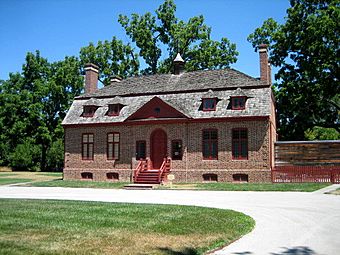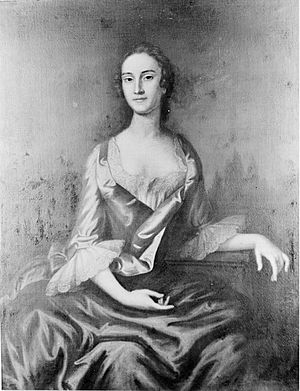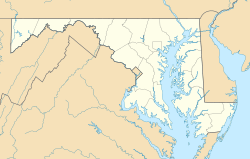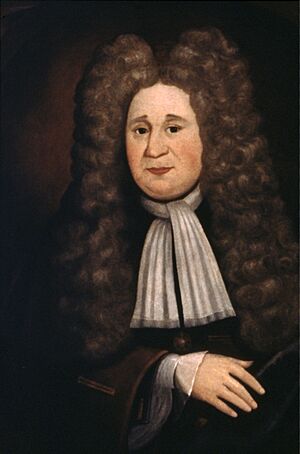Darnall's Chance facts for kids
Quick facts for kids |
|
|
Buck House
|
|

Darnall's Chance in July, 2007
|
|
| Location | 14800 Governor Oden Bowie Drive, Upper Marlboro, Maryland |
|---|---|
| Built | 1742 |
| NRHP reference No. | 78003118 |
| Added to NRHP | April 20, 1978 |
Darnall's Chance, also known as Buck House, is a historic home located in Upper Marlboro, Prince George's County, Maryland. It is named after Colonel Henry Darnall, a wealthy landowner who served as a leader in the Maryland colony.
The house itself was built around 1742 by a merchant named James Wardrop. He bought some of Darnall's land from Darnall's granddaughter, Eleanor Darnall Carroll, and her husband, Daniel Carroll. James Wardrop had 32 enslaved people working at the house.
Today, Darnall's Chance is a historic house museum. It opened to the public in 1988, allowing visitors to learn about its past.
Contents
History of Darnall's Chance
Early Beginnings
The land where Darnall's Chance stands was first claimed in 1704 by Colonel Henry Darnall. He was a rich landowner and an important official in the Maryland colony. He served as a special agent for the colony's owner, Charles Calvert, and was even a temporary governor. However, in 1689, Darnall lost his official positions.
When Colonel Darnall passed away in 1711, he owned a huge amount of land, about 27,000 acres, in Prince George's County. The property that became Darnall's Chance was passed down to his granddaughter, Eleanor Darnall. She married Daniel Carroll I in 1727.
Their family grew up on this large property. Two of their sons became very important figures in early American history. Daniel Carroll became a politician who helped create the United States Constitution. His brother, John Carroll, became the first Roman Catholic bishop in the United States and founded Georgetown University.
In 1741, the Carroll family sold a small part of their land, about 6.75 acres, to James Wardrop. He was a merchant from Scotland. Within a year, Wardrop built a 15-room brick house. This is the house that still stands on the property today. After living there alone for six years, Wardrop married 22-year-old Lettice Lee. Her father, Philip Lee Sr., was from a well-known family in Virginia.
Changes Over Time

In the mid-1800s, the house was updated. It was changed from one and a half stories to two stories. The brick was covered with stucco, and new design styles were added. These changes likely happened when Edward Grafton W. Hall owned the house between 1857 and 1887.
Modern History
The Maryland-National Capital Park and Planning Commission bought the house and property in 1974. They first planned to use it for offices. However, it was later decided to restore the house and open it as a museum.
Darnall's Chance was added to the National Register of Historic Places in 1978. The house was officially called the Buck House for a while, named after a later owner, Harry Buck, Sr. After being renovated and opened as a museum, it was renamed Darnall's Chance. This name honors its very first owner, Colonel Henry Darnall.
In 1986, the entire second floor and roof were removed. The house was then rebuilt to look exactly as it did in the 1700s. Two years later, in 1988, it opened its doors as the Darnall's Chance House Museum.
Darnall's Chance House Museum
The Darnall's Chance House Museum is a historic house that welcomes visitors. It is managed by the Maryland-National Capital Park and Planning Commission. When you visit, the tour often focuses on the life of Lettice Lee. She lived in the house for nearly 30 years, married three times, and was a unique woman for her time. The tour also shares information about other women who lived at Darnall's Chance and in Prince George's County during that period.
The museum is open for tours on Fridays and Sundays from noon to 4 PM. You can also arrange visits at other times by making an appointment. The museum offers fun programs for kids, like tea lessons and a "pirate-for-a-day" activity. They also host an annual gingerbread house contest. The museum has a tented patio that can be rented for events like weddings, holding up to 125 people.
Burial Vault Discovery
In 1987, an underground vault was found on the property. When it was discovered, the vault was filled with trash from the 1700s and 1800s. Beneath the trash, nine sets of human remains were found. These included three adults and six children. It was later determined that five of these individuals were Native Americans. Researchers concluded that the people had passed away from various illnesses.




